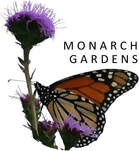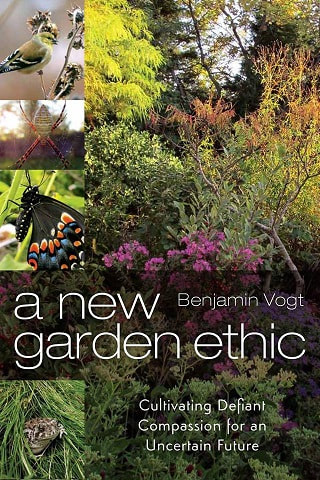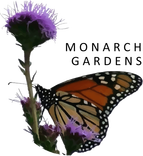I know we have this unfortunate line in the sand between native and exotic plants; we humans are great at dividing ourselves and relying on black / white thinking (memes feed off this and I'm as guilty as anyone). But it gets far more complicated when we have to also consider other fauna in the landscape, not just ourselves. Who are we gardening for? What's left for them? And in what ways will we greenwash our privilege to convince ourselves that what we want is actually what local wildlife want?
Over the years I've been eviscerated for being a native plant proponent because it comes off as moralistic finger wagging akin to puritanical religious ferocity. It's a fair critique, especially in the first years of my devotion to native plants as a cause. But as I explore in A New Garden Ethic, folks who feel like they've been guilted are also folks who've been asked or forced to look inward more authentically and unnervingly, to confront their privilege and supremacy, and be asked to rewire their point of view -- no easy task as humans love to find a groove and stay in it (it's comforting and stabilizing amid the chaos of existence).
Every garden, no matter what plant we are using, seeks respite, joy, peace, harmony, connection, and celebrates most wildlife that partake of our creation. But again, "our creation" rings with a hubris reserved for an apex species. No garden is ever truly natural.
The native plant debate is the tip of a much larger iceberg. The real conversation is about climate change and mass extinction, about one dominate species being out of balance, and about our culture openly and directly confronting our preconceptions of self worth.
Asking gardeners who use plants from any point of the globe to "restrict" themselves to mostly species endemic to their local ecoregion is limiting purely from an aesthetic point of view. Any critique of a native plant gardener (didactic, myopic) could easily be used on someone who believes plant origin is irrelevant, however.
The dominant system in horticulture now is to use any plant from any locale as long as the plants work together on that site -- even if the landscape appears more "natural" (dense and layered vs plants marooned in oceans of wood mulch). Any advocate of native plants will be seen as a destabilization of the status quo, a fringe voice, a radical voice, and a voice that needs to be silenced. The same goes for those advocating for a reduction in urban lawns.
And the voice needs to be silenced because, again, native plant advocates are asking us to confront a much larger, much deeper, much more complex topic -- who we garden for, how gardens effect various ecological functions, and how gardening is an extension of human colonization, privilege, and supremacy.
Let me say that again: native plant gardening asks us to confront human colonization, privilege, and supremacy. It's a profoundly uncomfortable act, and few of us will embrace the journey because humans are resistant to anything that asks us to reconsider our perception of self, our perception of self in the world, and our perception of the world in general that we've carefully curated to stabilize our emotional responses to being alive. A garden is, inherently, a place of refuge, personal freedom, solace, and artful expression. When we complicate this reality in any way, we erode or entirely remove our ability to cope with our animal brain that needs to create predictability from chaos in order not to feel threatened or afraid. This is gardening 101. And this is why looking at a garden from the perspective of indigenous fauna will always feel like a threat -- and if anything, it's a direct link to our colonization of indigenous human cultures. Horticulture is rife with colonization and erasure and appropriation and renaming. You don't have to look far.
Until we address horticulture as part of a larger system of violent colonization, we'll be stuck in the surface-level discussion of native vs. exotic plant and seldom enact more constructive change to our role within the local, regional, and global environment as agents of social justice for other species. And perhaps what's also at issue is that we are all trying to work through and process our environmental grief, each of the five stages a hurdle that trips us up (anger, denial, despair, bargaining, acceptance).
Gardening is powerful. It is an act of liberation and compassion and empathy. Gardening also carries great responsibility and power as it bridges cultures (human and animal) -- or burns those bridges knowingly and unknowingly. In the end, every gardener wants and works toward the same goal -- coming home to the natural world and finding our way through the practice of touching the soil. In that way we will always be fundamentally united as we struggle to find our way forward.


 RSS Feed
RSS Feed

